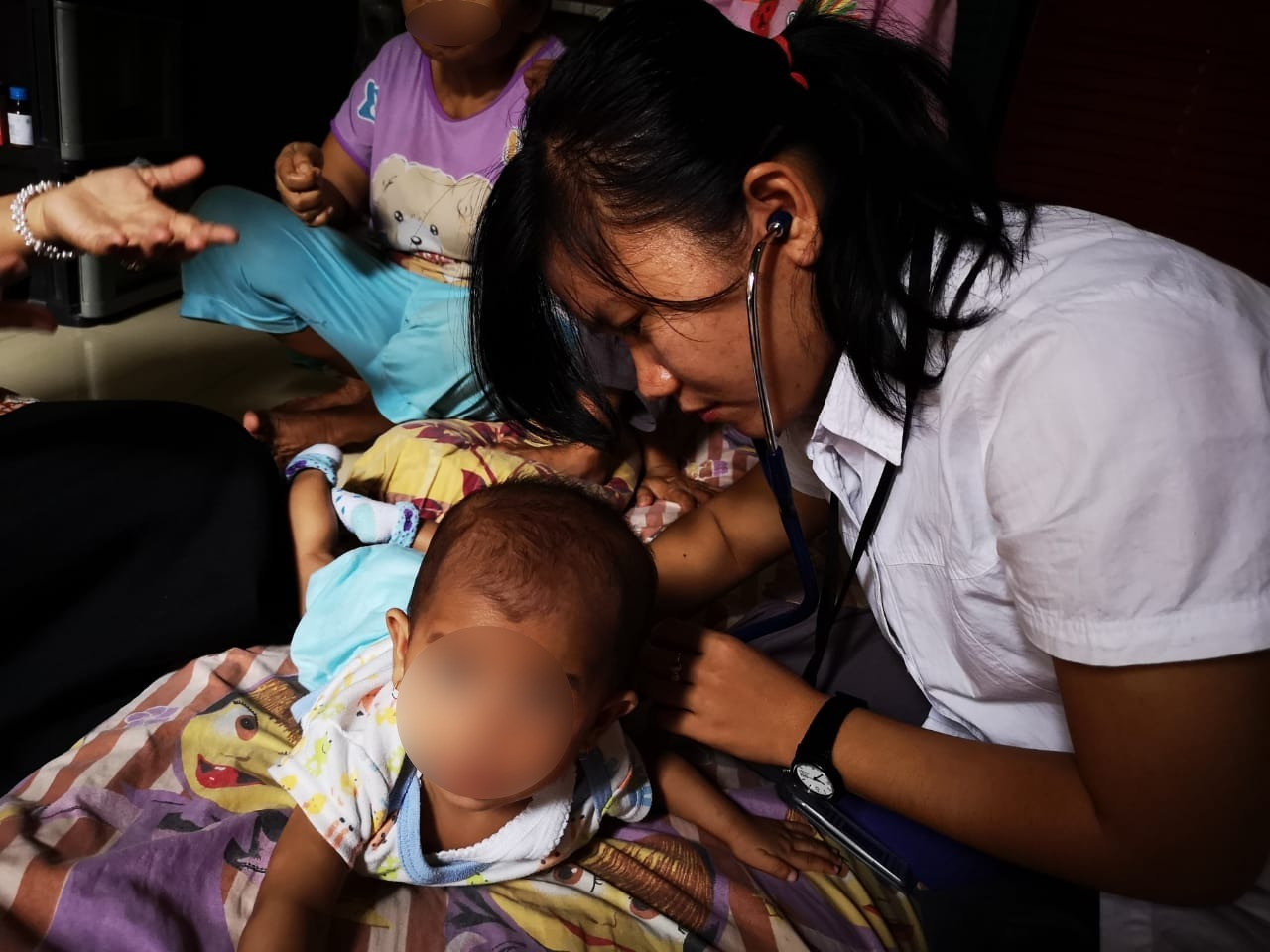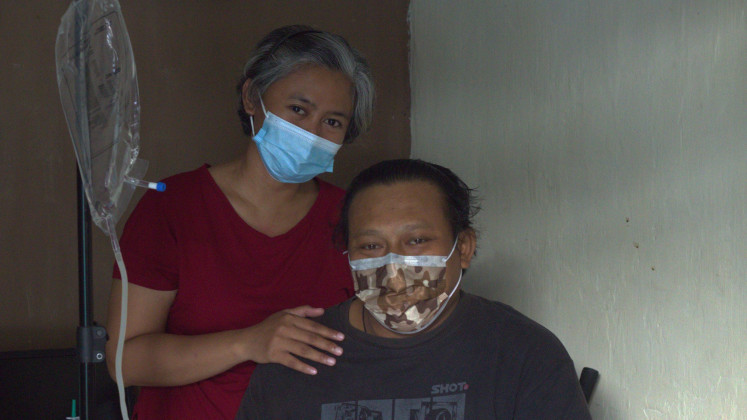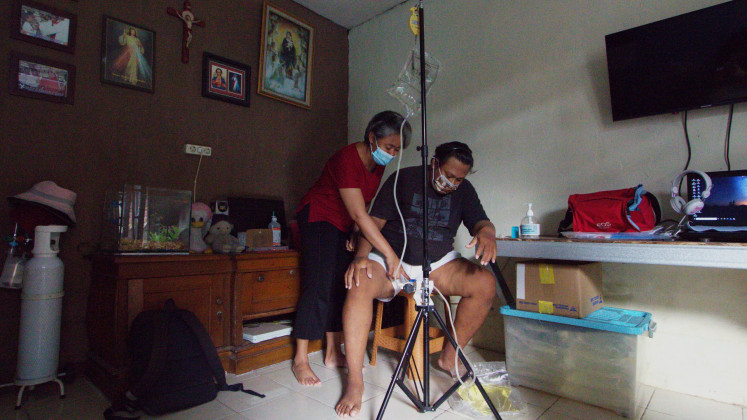Popular Reads
Top Results
Can't find what you're looking for?
View all search resultsPopular Reads
Top Results
Can't find what you're looking for?
View all search resultsIn life and death: Caretakers share their stories and struggles
Accompanying someone with chronic disease has never been easy. It is physically exhausting and psychologically draining, both for ordinary people and professional health workers. Life partners and caretakers share their stories.
Change text size
Gift Premium Articles
to Anyone
D
There was no laugh on Christine Windarwati's face when she asked her husband, Stefanus Meilarius, whether they should take their own lives, together.
"What if you suddenly die? [...] Never mind, let's just kill ourselves!", the 35-year-old recalls saying to her husband. He was recently diagnosed with a serious illness and she couldn’t bear the thought of him suddenly passing, leaving her to live alone.
"Why?" Christine remembers Stefanus asking her.
"In December, if nothing changes, let's just die together,” was the only retort she could give him.
"It's up to you,” he replied.
"Alright, me first? Or should I kill you first? What kind of suicide methods are we going to use? poison? I'm afraid of pain."
It was September 2019 when this exchange happened, a month after a doctor had diagnosed Stefanus with kidney disease. His condition was quickly deteriorating, along with his quality of life.
The 36-year-old required dialysis twice a week. Christine considered this disease a death sentence.
"I don't know much about dialysis. Everyone getting dialysis treatment will be dead soon. That's what I thought," said Christine.
Stefanus was in good shape before, though he did suffer from hypertension. He went for routine medical check-ups.
The disease changed Christine's life. She began looking after him intensely.
She learned that the public health insurance, BPJS Kesehatan, did not cover all medication costs.
"I didn't know there were drugs that were not covered; that the drugs were expensive. One pack (of medicine) can cost Rp 1.2 million (US$82)," she said.
A couple of dialysis treatments made Stefanus feel better. His face looked fresher, his body became more active and there was no sickness complaint. But these were rare.
Christine watched her husband suffer. At night, Stefanus could not sleep due to his back pain.
"He was a patient man, but since he got sick, he became a different figure. He became more sensitive and impatient," said Christine.
The situation worsened as their savings diminished. There was no alternative income; Christine could not manage her digital printing business, and Stefanus could no longer work as a freelance photographer.
Nursing till Death
Nursing patients with a terminal illness is never easy. This job is called palliative care.
Ribka Esterina, a 28-year-old professional palliative care nurse, said this work covered all aspects of life, even though it always had a sad ending.
Ribka worked as a palliative nurse for three years at Rachel House. This organization has a mission to give palliative care to children in Jakarta and satellite cities, such as Depok, Tangerang and Bekasi. A palliative nurse's duty covers everything from medical coordination with specialized doctors to limited psychological treatment and in some cases, even assisting families deal with their finances.
Medical therapy in palliative care is not intended to heal the patient. The treatment, such as chemotherapy for cancer patients, is only to improve the quality of life.
Ribka understands that her task is to ensure that the patients lead a life as good as their condition lets them. The job is never easy.
Once Ribka took care of a boy with brain cancer. This boy's older brother was jealous, because everyone in the house gave their attention to his little brother. Ribka helped both boys deal with the situation as much as she could.
"We have to be fair. Even if we bring gifts, it must be for both of them," she recalled.
Family issues have also been an obstacle for patients. Ribka helped take care of a child with HIV, which sadly still comes with certain stigmas attached to it. The family did not want to accept the child’s condition.
The emotional responsibility for people like Ribka (and Christine) is never easy.
Ribka recalls telling the father of a dying child who was trying to drive the boy to a hospital two hours away that it was best to stay at home and let the boy pass in as much peace as possible, surrounded by family and close ones.
"It's not easy to say when the time is up. But if you don't, maybe the father will take him to the hospital. Maybe the boy can't die accompanied by his family. So even though it's not easy, I dared myself to inform them," she recalled.
Tears dropped from Ribka's eyes as she shared her story.
Ella Cecilia, Operation and Quality Assurance Manager of Rachel House, a facility that provides palliative care to children from marginalized communities living with serious illnesses, said that palliative nurses also needed to be cared for. In addition to providing palliative services, her institution also offered space and therapy for various types of caregivers.
"It is like an empty glass. It needs to be filled again. We have time for variety," Ella explained.
A study about the psychological impact of chronic disease on the patients' partners, published by BioMed Central Public Health in 2019, shows that the patients' condition affects both their caretakers’ physical and psychological health, as they have limited time for themself.
A study published by the Western Journal of Medicine in 2000 shows that nursing someone with a chronic condition may provoke feelings of anxiety and professional inadequacy.
Nirmala Ika Kusumaningrum, a clinical psychologist, said a patient companion or palliative nurse's job was essential. Their presence could strengthen the patient's psychological condition.
This was crucial for the healing process or to improve their quality of life.
A professional caretaker not only cares for the patient but also the family, as the family’s emotional health could affect the patient.
"When the companion ‘drops’, the patient ‘drops’ even more, like a circle. That's why, ideally there must be a companion for families too," Nirmala said.
Stefanus admitted that having Christine by his side during all his medical treatment was precious. He understood that Christine may sometimes turn moody, but said that, above all, everything she did was for his good.
A year after making their pact, Christine and Stefanus have put those intentions aside.
Christine met with others from the hemodialysis patient community (Komunitas Pasien Cuci Darah Indonesia/ KPCDI) that provided her with information about the illness and easy access to services.
Stefanus has returned to work, although with limited capabilities. He is happy and increasingly dependent on life with Christine.
"She kept her promises, our wedding vow. That we don’t only stand together when we are happy but also when we are down. Until the end, she will be beside me.”
Additional reporting by Aryo Bhawono.












